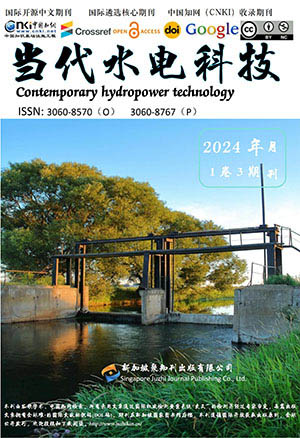
 info@juzhikan.asia
info@juzhikan.asia
 info@juzhikan.asia
info@juzhikan.asia
河岸侵蚀的监测与管理方法研究
李国栋
山西水务集团建设投资有限公司,山西省太原市,030006;
摘要:本文通过分析目前相关研究,介绍了河岸侵蚀的监测、建模和管理的最新进展,并概述了新的研究方向。 它有助于我们推进和理解监测活动如何表征外部驱动的影响,数值模型在预测系统响应时的能力和局限性是什 么,以及不同管理实践的有效性是什么,以防止和减轻河岸侵蚀和故障。首先,强调了在预测黏性土脱离时, 需要更好地理解侵蚀率随施加边界剪应力增加的非线性行为,并据此调整目前用于获得可蚀性参数的计算程序; 其次,强调了在河流修复项目的设计和评估中,需要将建模过程纳入其中。
关键词:河流侵蚀;监测;管理;研究进展
参考文献
[1]Tomer, M.D., Locke, M.A. The challenge of d ocumenting water quality benefits of conservat ion practices: A review of USDA-ARS’s Conserv ation Effects Assessment Project watershed stu dies[J]. Water Sci. Technol., 2001, 64, 300-31 0.
[2]Wilson, C.G., Kuhnle, R.A., Bosch, D.D., et al. Quantifying relative contributions from s ediment sources in Conservation Effects Assess ment Project watersheds[J]. J. Soil Water Cons erv, 2008, 63, 523-532.
[3]Laubel, A., Kronvang, B., Hald, A.B., et al. Hydromorphological and biological factors inf luencing sediment and phosphorus loss via bank erosion in small lowland rural streams in Den mark[J]. Hydrol. Process. 2003, 17, 3443-3463.
[4]Mittelstet, A.R., Storm, D.E., et al. Testi ng of the Modified Streambank Erosion and Inst ream Phosphorus Routines in the SWAT Model[J]. J. Am. Water Resour. Assoc., 2017, 53, 101-11 4.
[5]Fox, G.A., Purvis, R.A., Penn, C.J. Streamb anks: A net source of sediment and phosphorus to streams and rivers[J]. J. Environ. Manag., 2016, 181, 602-614.
[6]Pizzuto, J.E. Streambank Erosion and River Width Adjustment. In Sedimentation Engineering: Processes, Measurements, Modeling, and Practi ce, Garcia, M.H., Ed., American Society of Civ il Engineers (ASCE): Reston[M]. VA, USA, 2008, pp. 387-438.
[7]Schottler, S.P., Ulrich, J., Belmont, P., e t al. Almendinger, J.E. Twentieth century agri cultural drainage creates more erosive rivers [J]. Hydrol. Process., 2014, 28, 1951-1961.
[8] Arnold, E., Toran, L. Effects of Bank Vege tation and Incision on Erosion Rates in an Urb an Stream[J]. Water, 2018, 10, 482.
[9]Dragi′cevi′c, S., Pripu?i′c, M., ?ivkovi′c, et al. Spatial and Temporal Variability of Ban k Erosion during the Period 1930–2016: Case S tudy-ˇKolubara River Basin (Serbia)[J]. Water, 2017, 9, 748.
[10]Karimov, V.R., Sheshukov, A.Y. Effects of Intra-Storm Soil Moisture and Runoff Character istics on Ephemeral Gully Development: Evidenc e from a No-Till Field Study[J]. Water, 2017, 9, 742.
[11]Kociuba, W., Janicki, G. Effect of Meteoro logical Patterns on the Intensity of Streamban k Erosion in a Proglacial Gravel-Bed River (Sp itsbergen)[J]. Water, 2018, 10, 320.
[12]Enlow, H.K., Fox, G.A., Guertault, L. Wate rshed Variability in Streambank Erodibility an d Implications for Erosion Prediction[J]. Wate r, 2017, 9, 605.
[13]Huang, Z., Bai, Y., Xu, H., et al. A Theor etical Model to Predict the Critical Hydraulic Gradient for Soil Particle Movement under Two -Dimensional Seepage Flow[J]. Water, 2017, 9, 828.
[14]Lai, Y.G. Modeling Stream Bank Erosion: Pr actical Stream Results and Future Needs[J]. Wa ter, 2017, 9, 950.
[15]Mahalder, B., Schwartz, J.S., Palomino, A. M., et al. Estimating Erodibility Parameters f or Streambanks with Cohesive Soils Using the M ini Jet Test Device: A Comparison of Field and Computational Methods[J]. Water, 2018, 10, 30 4.
[16]Rousseau, Y.Y., Biron, P.M., Van de Wiel, M.J. Comparing the Sensitivity of Bank Retreat to Changes in Biophysical Conditions between Two Contrasting River Reaches Using a Coupled Morphodynamic Model[J]. Water, 2018, 10, 518.
[17]Vonwiller, L., Vetsch, D.F., Boes, R.M. Mo deling Streambank and Artificial Gravel Deposi t Erosion for Sediment Replenishment[J]. Water, 2018, 10, 508.
[18]Addisie, M.B., Langendoen, E.J., Aynalem, D.W., et al. Steenhuis, T.S. Assessment of Pra ctices for Controlling Shallow Valley-Bottom G ullies in the Sub-Humid Ethiopian Highlands[J]. Water, 2018, 10, 389.
[19]Beck, W., Isenhart, T., Moore, P., et al. Streambank Alluvial Unit Contributions to Susp ended Sediment and Total Phosphorus Loads, Wal nut Creek, Iowa, USA[J]. Water, 2018, 10, 111.
[20]Dave, N., Mittelstet, A.R. Quantifying Eff ectiveness of Streambank Stabilization Practic es on Cedar River, Nebraska[J]. Water, 2017, 9, 930.
作者简介:李国栋 1983.05 汉族,忻州市忻府区,副 高职称,科技创新中心主任,太原理工大学研究生, 研究方向:水库河道清淤,固废资源生态转化。